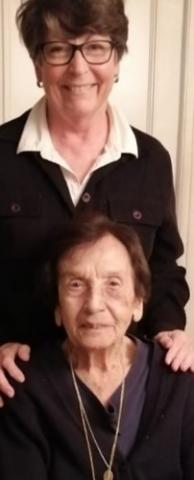
Sr. Linda Donovan, MM, on mission in Santiago, Chile, reflects on the special meaning of Pentecost for us as we emerge from a global pandemic.
This Sunday is Pentecost. I have been familiar with this feast since I was a child. We understood this to be the miracle of the coming of the Holy Spirit, a beautiful and festive celebration engendering new passion for the mission of Jesus.
As I sit reflecting on Pentecost in 2021, why does this year feel so different?
I have lived and worked in Chile for over 40 years and during this time have moved in and out of ministries that I have loved. Each ministry required all the energy, commitment, and “fire” that I could give it. Like the disciples following Jesus from town to town, miracle to miracle, I was part of a mission – the definition of which was clear and inspiring. To live and walk with the poor was a concrete, physical act or sacrament celebrated daily.
Then, as the pandemic began, much like the disciples we came to a full stop in all things familiar and were plunged into a reality never before experienced. And like the disciples, we huddled. We were afraid, disoriented, and angry. We not only couldn’t move, we were forbidden to. We did not know what we should be doing to continue our mission. We often were not in agreement with the authorities but, we did not want to risk the consequences on something so unknown. It took a while, but we began to see, as Sr. Colleen Gibson, SSJ, reflects in her article “An Uneasy Alleluia,” that fear would not vanish, but it could be changed. “New life,” she says, “requires engagement.”
But how to engage? At present, Chile is undergoing its second wave of COVID-19 in spite of its much-lauded vaccination efforts. Organizations, businesses, schools and offices have returned to functioning through internet platforms. We learned a great deal from the first wave, yet a huge majority continue falling deeper into ever-increasing poverty, job loss, and health consequences, augmenting violence and spreading delinquency, all while watching the rich get richer and the country’s overall economy projecting upward.
So, we return to the disciples' experience for inspiration. Even though on different occasions the disciples had experiences of seeing the risen Lord, they returned to the same room to tell their stories, hiding from the world. The sightings alone did not bring these faithful followers into “a new normal.” It was Pentecost that changed that.
The first thing we are told about the experience of Pentecost is that there came “a noise like a strong driving wind.” The disciples’ hearing was impaired. They could not hear each other in the same way as they had. In fact, they heard everything differently, or not at all. Then, “there appeared to them tongues as of fire which parted and came to rest on each of them.” They saw each other differently. These were the same people who had been huddled together for 50 days! And now their lived experience had shifted.
Finally, they reached out. And, we are told, they spoke in different tongues, but they understood each other. They began to re-image, re-symbolize, and re-describe the experience they had lived. It was a “new normal,” one that was truly new and not defined by being able to “get back to” everything they did before or how they did it. They were changed, radically changed.
The pandemic found me living in a part of the city that typically is considered “comfortable.” It has also been traditionally a place where one would be expected to maintain a prudent distance from one’s neighbors. To do otherwise would be considered bad taste by some. As we began to listen to our neighbors more deeply from a “Pentecost” reality, seeking to see and understand differently, Señora Julia came into our lives. Julia lives on the same floor as us and was someone we had always greeted. But empathy and engagement took us to a new place, and this is what I learned.
Julia is 97 years old. She is a direct descendent of two Chilean past presidents and would be considered aristocracy. But her husband and both of her children have predeceased her. While she has a few nieces and nephews, they live far from Santiago and the quarantine rules prohibit visits. Financially she relies on her retirement and that of her husband, combined with donations from her family which, after rent, leaves her with an impossibly small sum for all other monthly expenses. Only with time, persistence, and acceptance of our “new normal” could a new reality slowly begin for both of us, opening a door to friendship based in engagement rather than class conventions.
So, this Pentecost, I hear the invitation to engage from a new place of conversion.
“To each of us the manifestation of the Spirit is given for some benefit” (1 Corinthians 12). May we hear each other differently, more clearly. May we speak to each other, heart to heart, seeing each other for who we are. May we engage at a deeper level, prioritizing the poor, and when we hear the words, “as the Father has sent me, so I send you,” may we work to bring forth the authentic “new normal” that we truly long for.
Photo of Sr. Linda Donovan and "Julia" courtesy of Sr. Linda Donovan.
